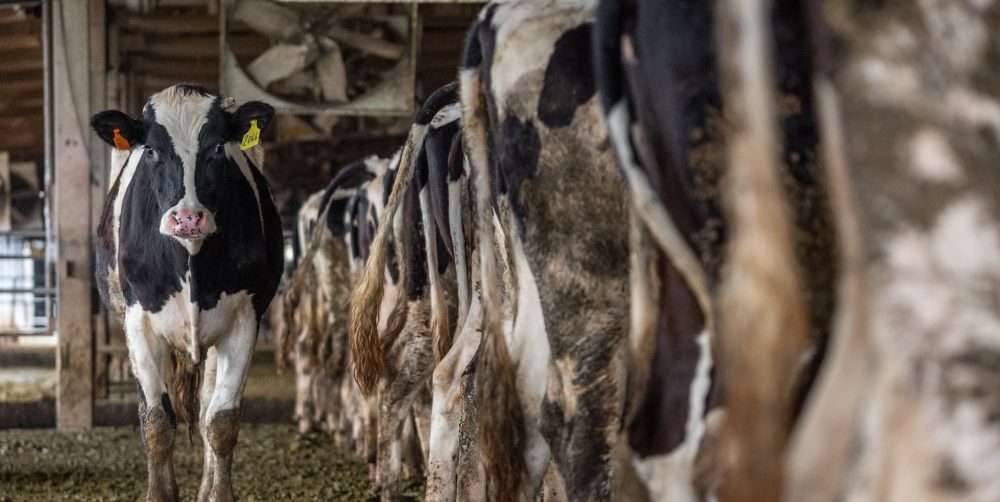
 Laura Freeman* (left) is a Dual licensed GP, Lifestyle Medicine Physician, and Medical Director of Plant-Based Health Online. She is on Twitter: @PBhealthonline
Laura Freeman* (left) is a Dual licensed GP, Lifestyle Medicine Physician, and Medical Director of Plant-Based Health Online. She is on Twitter: @PBhealthonline
Shireen Kassam* (right) is a Consultant Haematologist, lifestyle medicine physician, and founder of Plant-Based Health Professionals UK. She is on Twitter: @plantbasedhpuk
We are facing a number of inter-related crises that are in part caused by our food system, which is no longer fit for purpose. We expect our food system to produce healthy, nutritious food that is sustainable for producers, society and the planet. Yet our farming and food systems are major drivers of the climate and biodiversity crises and fails to promote the health of populations. One action we could all immediately take to improve the situation is to remove red meat from our diets.
The 2020 report of the Lancet Countdown on health and climate change finds that excess red meat consumption is causing nearly a million deaths globally every year and in Europe this accounts for 3.4% of all deaths. But what is considered excess consumption? In the original Eat Lancet report of 2019 it states, ‘Because intake of red meat is not essential and appears to be linearly related to total mortality and risks of other health outcomes in populations that have consumed it for many years, optimal intake might be 0 g/day, especially if replaced by plant sources of protein’.
Red meat and more so processed red meat is directly associated with an increased risk of cardiovascular disease and type 2 diabetes. For example, swapping just one serving of red or processed meat daily for beans or nuts could reduce the risk of heart disease by 10-15%. Replacing just one serving of red meat per day with any other source of protein could reduce the risk of type 2 diabetes by up to 20%. More concerningly, processed red meat has been classified a group 1 carcinogen and red meat a group 2 carcinogen by the WHO. It is estimated that 13% of colorectal cancer cases in the UK are caused by the consumption of processed meat and this may be as high as 20% of cases when all red meat is considered. The UK government advises no more than 70g or red and processed meat consumption per day, yet on average we are consuming 38.3g of red meat and 55.4g of processed meat per day.
Red meat consumption is not essential for humans and in fact adversely affects health.
Moving to a ‘flexitarian’ diet … with … only one portion of red meat per week … could reduce food system-related greenhouse gas emissions by up to 80%, whilst reducing premature mortality by 20%.
As healthcare professionals we are trusted members of society and have been called to action to play our part in the fight against climate change. Changing our own diet and supporting our patients, families and communities to do the same is an essential part of the solution. This change can be almost immediate without the need for policy change or government support. It does however require a focus on knowledge and skills to support a healthy transition away from red meat consumption towards a more plant-based way of eating. This is easily achievable and well within the skill set of doctors, with co-benefits for personal health. Some physicians support our own viewpoint that this is now our moral and ethical duty.
With this in mind, we are seeing encouraging changes taking place. On April 29th, Laura and I led a panel discussion at the Planetary Health Alliance annual conference on behalf of WONCA, on the role of family doctors in advising patients to cut down red meat consumption, which was met with a reassuring level of support. My workplace, King’s College Hospital is promoting the international campaign ‘No Meat May’, which calls for citizens to adopt a plant-based diet for the month of May and beyond, to its 10,000 staff members with catering teams providing additional vegan and vegetarian meals.
Removing red and processed meat from our diets is an easy win. Civil society is already taking action with Epicurious, a large repository of recipes, no longer publishing new recipes that contain beef, and one of the world’s top restaurants in New York, Eleven Maddison Park, removing all animal foods from the menu. Let’s not be left behind but act now, for people and the planet.
*DOI: Shireen and Laura are co-founders of the community interest company, Plant Based Health Online.
Featured photo by Jo-Anne McArthur on Unsplash







Many thanks for highlighting this important topic. Removing red meat from the diet is a easy win for our health and the planet. Fully supportive
As an NHS Consultant Gastroenterologist I couldn’t agree more. Red & processed meat cause about 9,000 cases of CRC in the UK each year. We must respect patient autonomy by ensuring that they are aware of the impact of these foods on risk before deciding whether their will eat them.
Such a great article – so important to highlight the detrimental effects of red meat on both human and planetary health. Replacing with good quality plant proteins will not only reduce the risk of chronic disease, but will have a positive impact on our environment.
So many easy, tasty and healthier ways to swap red meat and processed meat for plant-based foods. Love that this article shows both the environmental and life-saving benefits of doing so!
Such an important issue, we can’t shy away from this. We all need to take steps now to protect our health and our planet’s future!
The evidence is so clear, red meat is shown to be as detrimental to health as smoking or excess alcohol. There should be no doubt doctors need to support any patient to reduce or stop intake.
Brilliant article. It shows how important it is to reduce and eliminate red meat from human diet not only for our health but for the planet too. At the same time, it is so easy, less costly and delicious to replace red meat with plant based foods.
A timely reminder of such an important point, thank you
Great article. Thank you so much for advocating for change. It’s so important on so many levels and I have such hope and relief knowing that PBHP are getting this information out there. 💚🌿
Excellent article. There is more than enough evidence now that eating any animal products is causing climate breakdown, environmental damage, and serious health issues. The fact that people like the taste of flesh or the lactation fluids of another species is no justification for the damage caused.
Excellent article with such an important message.
It’s great to see this message in the mainstream. As health professionals we have a real opportunity to help people transition to diets which support their own health and that of the planet. Information like this is easy to digest (no pun intended!) and to share with our patients. We might not feel confident about complex nutrition info but all healthcare professionals can share the message that meat is not needed for a healthy diet, and there are many reasons to leave it off the plate. Our NoMeatMay campaign at Kings show individuals & organisations are open to this message and want to hear more. Thanks for sharing!
Thankyou so much for this. I’ve popped over to the darkside to read this, as I’m a former a&e nurse. It used to break my heart seeing so many people, including family members, suffer because of meat consumption. I knew it was causing so many problems, but 17 years ago, had no proof. We all need to stop eating red meat. Not just for our health. but for the health of the planet. We shouldn’t keep doing something that is destroying the future of the generations that follow us. <3
Excellent article, thank you. So happy to see health professionals providing leadership in this area which is so important and urgent for both human and planetary health.
Such an important article and the message needs to be heard!
Excellent article, such a crucial message for everyone to start making a change for both human and planetary health.
Excellent article, thank you! Working at the coal face in NHS general practice in rural Scotland for many years, I have seen so much lifestyle induced ill health. Many patients drink too much and also smoke, and in addition to consuming red and processed meat, such patients may have only minimal amounts of fruit and vegetables in their diet, no whole grains and no legumes. Physical activity levels are universally low. Doctors need to have the knowledge and the courage to address all of these. It is important for doctors to lead by learning about and adopting healthy habits, and finding effective ways for sharing this knowledge with patients at almost every encounter.
In light of the growing awareness of the need to reduce or eliminate animal foods in the diet, physicians must advise their patients accordingly. Patient confidence will suffer if the doctor does not understand the relevance and urgency of becoming more plantbased. Thank you for writing this important article.
So pleased that the science is getting out there. We need to be building good health into the NHS rather than being left to deal with the consequences of bad lifestyle.
Super article. The general public trust medical professionals and their advice. Thank you for taking the lead in this very important issue.
Excellent article summarizing the many reasons why we should help patients move away from red meat while also speaking to our ethical duty, as healthcare providers, to help fight the climate crises. Thank you!
A great article!!! It’s so easy to cut meat from your diet. Unfortunately the government is just not doing enough to promote this.
Great article. Nice to know that the medical profession can be involved in preventing illness.
Great article!!!! I’m sure it will make a difference.
Fully 100% supportive of this campaign.
There is no reason for red meat to be continued to be “put on the table” with its hugely detrimental health & environmental impact. Thank you both for this valuable & very much essential work.
Thank you for writing this important article, the evidence is so clear for the significant negative impacts on individual and planetary health. It is imperative now that health professionals take up this ‘call to action’. Thank you to the authors.
Excellent article!
Fantastic article! It is also incredibly important to remember that meat consumption is a major driver in the risk of future pandemics. 30% of emerging infectious diseases are due to land use change such as deforestation. 80% of deforestation globally is due to agriculture and 80% of agricultural land is used for livestock. Intensive livestock rearing also increases the risk of pandemics. This is an important link to convey to our patients, reducing their meat consumption would benefit their own health and reduce the risk of future pandemics!
Great article and very important message! I used to eat a lot of red meat and have recently given up. If I can do it, everyone can!
Brilliant article, such an informative read.
So interesting. Such good alternatives available now that no one need miss red meat!
For the future of our health, our kids, and grandkids this article spells it out so clearly. We should all embrace this fully and move towards a plant based diet. Having family doctors lead the way would certainly make this much easier for us all.
Susan F.
Thank you for this excellent article. We are approaching a state of emergency with regard to lifestyle disease, climate crisis and animal welfare. Red meat is not necessary for human health and is in fact detrimental. This message must become mainstream and primary care physicians are perfectly positioned to disseminate it and guide patients towards healthier choices.
To me this is such a no brainer. It’s horrible for us, horrible for the planet and horrible for the animals… what else is there to discuss? Thank you for this great and important article!
This is an excellent article which highlights the detrimental effects of red meat on our health and the planet. I have changed my thinking on eating red meat and other animal derived produce as a result of Plant Based Health professionals UK and Plant Based Health Online. It’s never too late to change one’s eating habits !
Excellent article, I hope this reaches far and wide – such an important topic.
All things considered, this seems pretty straightforward. Of course GPs should support their patients in moving away from something which is damaging their health, and we should equip them with the tools to do so.
Thank you for highlighting this issue and as a GP myself I fully support this message. The evidence is overwhelming and as frontline doctors we have no excuse not to advise our patients about the health risks of red meat consumption, but also white meat (i.e. chicken), which is mistakenly seen as healthy. Patients often admit to eating chicken/meat on a daily basis, which is not healthy for us humans, or the planet. So far, a huge majority of my patients have been very receptive to learn more about the health benefits of plant-predominant diet.
I fully support this message as a plant based GP. It should be a complete no brainer once you know the facts, and when you know them, you can’t un- know them!
I switched over night after watching the forks over knives documentary 6 years ago and was amazed none of it had been taught at medical schools!
A clear and compelling article! There is nothing better we can do as individuals than giving up eating meat! A real big puzzle why family doctors are not telling their patients to remove red meat from their diet. Very timely reminder!
Such an excellent and important article. The evidence is so compelling and I hope more healthcare professionals will follow your lead. Being able to do something so simple to improve our own health and the health of the planet is indeed such an easy win – and we don’t get so many of those! Thanks for all the amazing work you are doing 🙂
[…] Read this article by Dr Laura Freeman and myself on why health professionals should be leading on this dietary change. Just removing red meat from the diet could have an enormous impact on human and planetary health. […]
[…] there is no place for these ‘foods’ in our modern diet. That’s why we are calling for all health professionals to support patients and citizens to remove all red meat from the […]
A review of the week’s plant-based nutrition news 5th December 2021This week I cover the 2021 Global Nutrition Report, the red meat trade and impact on health outcomes, effects of wine, chocolate and coffee consumption, plant-based diets and cardiovascular disease and nutrition eduction in medical schools.Full reportGLOBAL NUTRITION REPORT 2021: This report makes for very sad reading. It clearly describes that globally we are way off course on dealing with the issues of malnutrition, which includes stunting, wasting and overweight/obesity. Worldwide, 149.2 million children under 5 years of age are stunted, 45.4 million are wasted and 38.9 million are overweight. Over 40% of all men and women (2.2 billion people) are now overweight or obese. Diet-related disease and mortality continues to rise with poor diets resulting in 1 in 4 deaths globally (26%). The proportion of premature deaths attributed to dietary risks is highest in Northern America and Europe (31% each), and lowest but also at notable levels in Africa (17%).Diets remain insufficient in healthy plant foods, whilst being too high in meat, salt and sugar. Fruit and vegetable intake remains 50% below the recommended level of five servings per day that is considered healthy, and legume and nut intakes are each more than two thirds below the recommended two servings per day. In contrast, red and processed meat intake is on the rise and almost five times the maximum level of one serving per week, while the consumption of sugary drinks, which are not recommended in any amount, is going up as well.The report finds that our food system continues to harm the planet creating more than a third (35%) of all greenhouse emissions and using substantial and rising amounts of environmental resources, with animal-sourced ‘foods’ responsible for the majority of greenhouse gas emissions and land use.As a result, the cost to society of dealing with the consequences of our broken food system and unhealthy diets are astronomical and unsustainable. Therefore, we need urgent initiatives to transform food systems, increase the intake of health-promoting foods, and reduce animal-based ‘foods’, to ensure diets are healthy and sustainable for people and the planet. Of course, in high income countries, most of us don’t need to wait for these policy changes, we can immediately take action by changing our diet and focusing on plant-based foods.Full paperNUTRITION EDUCATION FOR MEDICAL STUDENTS: One required urgent action as part of food system transformation is to incorporate more nutrition education into undergraduate healthcare and medical curricula. This has been recognised in the UK with the recently published nutrition curriculum and competencies for medical students. But how should the curriculum be implemented and which teaching methods are going to be effective at supporting clinicians incorporate nutrition counselling into their clinical practice?I am proud to have supported our medical student member, Priya Patel, to publish her Masters project. This review is an update to the prior one published in 2017 that found a lack of adopted curricular standards for teaching clinical nutrition and that educators should consider including interprofessional education approaches, online learning, placing an emphasis on learners’ personal health behaviours, and standardised and real patient interactions.Our review evaluated nutrition education interventions delivered to medical students and published between 2015 and 2020 in 15 papers. The analysis showed that most interventions were optional rather than compulsory for students and only four explicitly used interprofessional learning. There were however more novel methods used such as interactive cooking and some required students to teach their peers, school children or families about nutrition i.e. learning by teaching. However, content and evaluation of most interventions were heterogenous and there was difficulty identifying the impact of these interventions.Overall, the study highlights the advantages of utilising interprofessional learning, focusing on student’s personal health behaviours and harnessing novel teaching methods such as hands-on cooking. It also highlights the need to use standardised, objective measures of outcomes and the need for a curricula-wide approach to integrating nutrition education.At PBHP UK, Dr Hayley Tait, GP, chef and author is leading our latest project called ‘Cooking for the Climate’ and she is teaching hands on plant-based cooking to medical students at Exeter and Southampton University. We hope to be adding more medical schools to the programme very soon.Full paperPLANT-BASED DIET AND CARDIOVASCULAR DISEASE (CVD): The most well established benefits of a plant-based diet are the impact on cardiovascular disease. Pretty useful given that CVD remains the top cause of mortality globally. We know that plant-based diets reduce the incidence of CVD risk factors including high blood pressure and cholesterol, overweight/obesity, type 2 diabetes and inflammation. It’s also useful to consider actual CVD outcomes such as incidence and mortality.This paper brings together data from 13 cohort studies including 410,085 participants. These studies assessed the impact of a plant-based diet using the plant-based diet index and also included studies with vegetarian and vegan participants (78,672 in total).The results showed that adherence to a healthy plant-based diet significantly reduced the risk of developing CVD (10.2% reduction) and dying from CVD (8.1%). In most studies vegetarians and vegans tend to be analysed together and there was a definite consistent reduction in CVD incidence, particularly seen in vegetarians, but impact on mortality was less obvious given the heterogeneity in diet quality. Unhealthy plant-based diets increased the risk of CVD.The authors conclude ‘This study provides important evidence to suggest a possible protective role of plant-based dietary patterns against cardiovascular mortality and CVD among the general population’. Of note, a recent meta-analysis examining the effect of a vegetarian diet on CVD morality showed a 30% reduction in risk of death from ischaemic heart disease.These facts alone provide sound evidence for promotion and implementation of a plant-based diet as the default diet for humans.Full articleWINE, CHOCOLATE AND COFFEE: This is a nice, short, open access review of three dietary items often discussed amongst those on a plant-based diet. Food and drink can have varied effects in different scenarios and as always, the impact depends on the overall quality of the diet.Overall, there is very little evidence for a benefit of wine consumption and concerns over adverse effects on brain health and cancer risk are greater. In contrast cocoa beans have been associated with a number of benefits such as lower blood pressure, better endothelial health and positive effects on platelet function and insulin sensitivity. Of course, this relates to the consumption of dark chocolate (70% of more cocoa) and not milk chocolate or varieties with more sugar than cocoa. Overall, habitual coffee consumption, including decaffinated versions, are associated with health benefits, protecting against cardiovascular disease, type 2 diabetes and chronic disease in general.Chocolate and coffee are not necessary in the diet and these items may not suit everyone, but for those of us who do enjoy these, this is welcome news.Full paperTHE RED AND PROCESSED MEAT TRADE: If we are going to curb the continued rise in diet-related diseases, we need to address food production and trade first and foremost. This paper asked two questions:(1) What is the impact of red and processed meat trade on diet-related non-communicable diseases (NCDs)?(2) Which countries are particularly vulnerable to diet-related NCDs due to red and processed meat trade?14 red meat and six processed meat items were selected and the authors investigated bilateral meat trade flows across 154 countries. The NCDs considered were ischaemic heart disease, colorectal cancer and type 2 diabetes.The results showed that overall the global red and processed meat trade increased 148.4% when comparing the years 1993–1995 to 2016–2018. This increase in red and processed meat consumption with trade accounted for 10, 898 attributable deaths in 2016–2018, which was an increase of 74.6% when comparing deaths from 1993 to 1995. This was also associated with a significant increase in disability. A greater proportion of these deaths and disabilities were in developing countries compared to developed countries. Overall, 1.1–1.6% of all global deaths and disability are attributable to the red and processed meat trade.The authors conclude ‘that global increases in red and processed meat trade contribute to the abrupt increase of diet-related NCDs, and the attributable burden of diet-related NCDs has large geographical variations among countries. To prevent unintended health consequences due to red and processed meat trade, future interventions need to urgently integrate health policies with agricultural and trade policies by cooperating between responsible exporting and importing countries’.Health professionals need to play a major role in supporting patients and communities reduce and ultimately eliminate the consumption of red meat. Here is an article written by Dr Laura Freeman and myself for the BJGPlife magazine.Please follow my organisation ‘plant-based health professionals UK’ on Instagram @plantbasedhealthprofessionals and facebook. You can support our work by joining as a member or making a donation via the website. Back To News